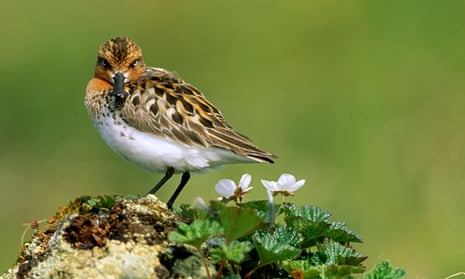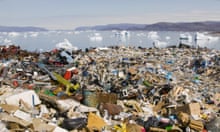International efforts to meet targets to stem the loss of wildlife and habitats are failing miserably, according to a UN report.
The Global Biodiversity Outlook 4, published as nearly 200 countries meet on Monday in South Korea in a bid to tackle biodiversity loss, paints a damning picture of governments’ efforts to meet a set of targets agreed in 2010 to slow the destruction of species’ habitats, cut pollution and stop overfishing by the end of the decade.
Conservationists said the lack of progress, nearly halfway to the 2020 deadline for the targets, was a troubling sign and a reality check.
The situation of the planet’s most threatened species, which include 90% of all lemurs and species such as the blue-tongued forest giraffe and spoon-billed sandpiper, is getting worse rather than better. “The average risk of extinction for birds, mammals, amphibians and corals shows no sign of decreasing,” the report says.
The set of 20 targets are broken down into 56 elements, of which only five are on track for 2020. Thirty-three show progress, but at an insufficient rate to meet the targets, 10 show no progress, five show things getting worse and three have not been evaluated.
A key pledge to halve the loss of natural habitats, including forests, is one of the targets that will be missed. “While global rates of deforestation are declining, they remain alarmingly high,” the report says.
One small ray of light is progress toward a target of gaining protected status for 17% of ecosystems on land, which is on track. A similar target for the oceans is, however, likely to be missed.
Ban Ki-moon, the UN secretary general, said the report showed it was time to “redouble efforts to achieve our shared goals”.
Braulio Ferreira de Souza Dias, the executive secretary of the Convention on Biological Diversity, said: “The good news is that parties are making progress and concrete commitments to implement the Aichi biodiversity targets. However, the report also shows us that efforts need to be significantly scaled up.”
The UN report follows a study last week in the journal Science, the first ever analysis of progress on the targets, which came to similar conclusions.
Dr Richard Gregory, one of the Science paper’s authors and the head of species monitoring and research at the RSPB, said: “World leaders are currently grappling with many crises affecting our future, but this study shows there is a collective failure to address the loss of biodiversity, which is arguably one of the greatest crises facing humanity.” He called the lack of progress “a troubling sign for us all.”
If the 2020 targets are missed, it will not be the first time efforts to halt the decline in the richness and abundance of wildlife and the natural world have fallen short. An assessment of goals set in 2002 to cut the rate of biodiversity loss by 2010 showed governments had failed to deliver on the commitments they made.
“This is a reality check halfway to 2020,” said Mike Hoffmann, a senior scientist on species survival at the International Union for the Conservation of Nature.
“We’re in serious danger of being in the same position as we were back in 2010, of not having made the progress we need to make to lead to a better society and a better world.
“It’s not to say we’re not having successes. We don’t do enough to champion the conservation successes, without which we’d be in a much worse situation.”
But, he said: “The bottom line is we’re not doing enough and we’re going to have to do much much more to change things in the next five things.”




Comments (…)
Sign in or create your Guardian account to join the discussion